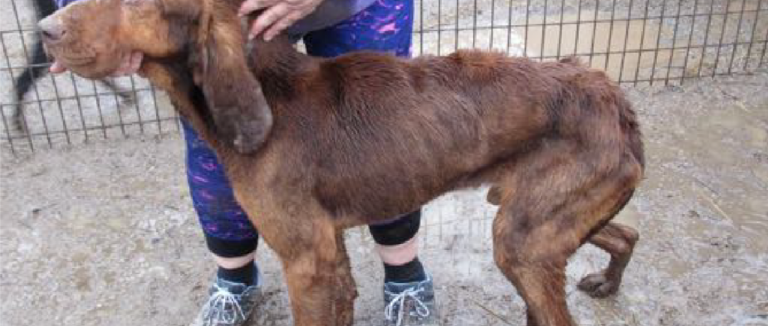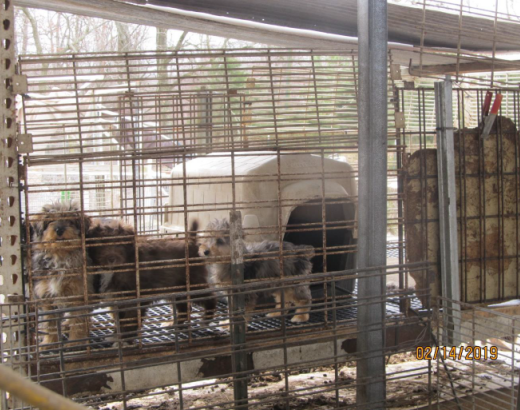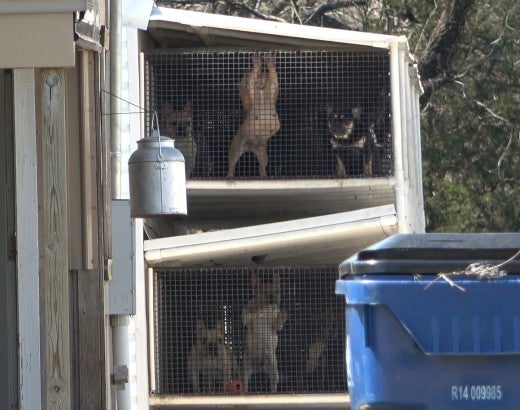Last year, a state inspector visiting Wendy Pets, a puppy mill in Seneca, Kansas, found 24 dogs had simply disappeared from the facility. When asked, a representative told the inspector he had “euthanized” the dogs by shooting them. Although he had been breeding dogs for years, he claimed “he wasn’t aware” he wasn’t allowed to destroy his dogs this way.
In Sturgeon, Missouri, a state inspector found the owner of TLC Kennels had left his dogs out in the cold with only blue barrels for shelter or on dangerous wire flooring.
And at Stonehenge Kennel in West Point, Iowa, a U.S. Department of Agriculture inspector found more injured dogs at a kennel with a long history of violations, making a total of almost 50 dogs found ill or injured on the property since 2015.
Although state inspectors cited the owners of Wendy Pets and TLC Kennels, none of the three mills were fined by the USDA, nor were their licenses revoked. That means all three of them can continue to sell to pet stores across the country.
These cases, as sad and shocking as they are, are just a few examples of the mistreatment animals continue to endure in these and other puppy mills that appear in our latest Horrible Hundred report on problem puppy dealers and breeders in the United States.
From starving dogs to animals with gaping, untreated wounds, to dogs who died “suddenly” of untreated illnesses, the report, sourced from USDA and state inspection reports, offers a look into a sordid and intensely abusive world where animals are treated as nothing more than profit-making commodities, where they are not given the most basic needs like adequate food and water, and where they are often disposed of cruelly once they have outlived their purpose.
We have been bringing you this report for eight years now, but the urgency to get it out has become even greater under the Trump administration because increasingly we cannot count on the USDA, which is supposed to ensure that animals do not suffer in businesses like puppy mills, to do its job. As I’ve been telling you on this blog, the agency tasked with enforcing the Animal Welfare Act has drastically scaled down inspections of businesses like puppy mills in recent years.
Here are some other significant findings in our 2020 Horrible Hundred report:
- For the eighth year in a row, Missouri had more problem dealers on the list than any other state. Altogether there are 30 dealers from the state on our list, but the state’s attorney general is currently taking some of them to court. One of these, a dealer named Cory Mincey, dodged 35 state inspections and was repeatedly found with sickly and gaunt dogs. Another, Marlisa McAlmond, had dogs who were severely emaciated with their ribs and spines showing.
- Other states with multiple dealers in the report include Ohio with nine, Kansas and Wisconsin with eight each, Georgia with seven, Pennsylvania with six, and Indiana and Iowa with five each.
- Almost one-third of the breeders in the report claimed some affiliation with the American Kennel Club, a dog registry that claims to support quality care for dogs, but actually fights laws designed to protect them.
- More than half of the breeders in the report are USDA-licensed, which means they can legally sell to pet stores or online, sight-unseen. The other half are either state-licensed, or appear to be unlicensed.
- Some of the dealers with egregious violations on their state records have not been cited for a single USDA violation in the same years that state inspectors have flagged horrible problems at these mills.
- Several of the puppy mills in our report have sold dogs to Petland, the nation's largest puppy-selling chain, which has been the subject of eight HSUS investigations for the mistreatment of the animals in their care.
The coronavirus pandemic has created an even more dire situation for dogs trapped in puppy mills. In late March, the USDA sent a notice to all licensees and registrants informing them that the agency would be “limiting routine inspections” due to the pandemic. If licensees do not want to participate in any inspection, they can simply tell their inspector to “come back another time.” This pause in routine inspections, with no specific end date, leaves tens of thousands of dogs who are already suffering in puppy mills at even greater risk. Many state agencies have had to pause routine kennel visits as well.
Many puppy mills also operate under the radar or in states with no licensing and inspection laws, which means animals there are never seen by an inspector and the breeder is never held accountable.
That’s why we urgently need strong state laws for inspections of commercial dog breeders and to end the sales of puppy mill dogs in pet stores as well as online. Three states—California, Maryland and Maine— and more than 350 localities already have laws that prohibit the sales of puppy mill dogs in pet stores. We are working in other states to pass similar laws.
We are also calling on Congress to pass legislation including the Puppy Protection Act that would upgrade standards of care for dogs, and the WOOF Act that would make it harder for USDA-licensed breeders and exhibitors with severe and multiple Animal Welfare Act violations to get new licenses until they are in compliance. Further, we are supporting the Providing Responsible Emergency Plans for Animals at Risk of Emerging Disasters (PREPARED) Act that would require all facilities regulated under the Animal Welfare Act, including puppy mills, to have emergency response plans for the animals in their care when disaster strikes.
But as consumers, you have the greatest power to stop the problem of puppy mills. If you are looking to bring a companion animal home, look to reputable rescue groups or animal shelters, which are using innovative ways during the pandemic to ensure animals in their care are placed in loving adoptive or foster homes. Or seek out a small-scale responsible breeder who treats their animals like part of the family. Internet sellers and pet stores are more likely than not to source their animals from puppy mills, and the only way we can root out this problem for good is for each one of us to refuse to support the cruelty with our dollars.



